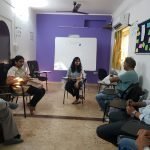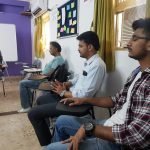The talk was delivered by Ms. Janhavi Kelaskar on 5th April 2019 at ICHARS Centre (Mumbai- Andheri). Janhavi is a clinical psychologist who currently works as a therapist and trainer with Institute of Clinical Hypnosis and Related Sciences, Mumbai. She holds great interest in helping her clients understand the core of themselves. And what’s the best way to know your core? Mindfulness!
Objective:
The following were the objectives which the trainer kept in her mind while delivering the talk.
- Explain what is mindfulness
- How to increase your mindfulness
- Reduction of stress and tension
- Ability to think clearly and focus
- More happiness and joy in daily life
- Increased self-awareness
- Better sleep and greater relaxation
Target Audience:
- Participants mainly consisted of adults and adolescents and practising hypnotherapists.
Outcomes:
The participants could practice mindfulness in the desired aspects of their life. Many gave good reviews about the talk later.
Following are the other outcomes which were achieved:
- Learnt new ways to approach stressful situations
- Understood myths and facts about mindfulness
- Learnt to practice progressive muscle relaxation to be mindful about body
- Understood practising mindfulness while processing emotions
- Learnt easy ways to practise mindfulness in almost all situations.
- Increased focus in their day-to-day activities
Description:
The talk started with the participants introducing each other. Next the participants were asked their expectations from this talk.
We started by discussing their ideas about mindfulness and then concretely defined what mindfulness is. Mindfulness is the basic human ability to be fully present, aware of where we are and what we’re doing, and not overly reactive or overwhelmed by what’s going on around us. Then the participants were asked if they practised mindfulness and what do they exactly do!
They were told how mindfulness as a concept came into existence, its roots and who contributed in it.
The participants were informed that mindfulness is innate, it can be cultivated through proven techniques, particularly seated, walking, standing, and moving meditation (it’s also possible lying down but often leads to sleep); short pauses we insert into everyday life; and merging meditation practice with other activities, such as yoga or sports.
When we meditate it doesn’t help to fixate on the benefits, but rather to just do the practice, and yet there are benefits or no one would do it. When we’re mindful, we reduce stress, enhance performance, gain insight and awareness through observing our own mind, and increase our attention to others’ well-being.
Next they were told 8 things they must know about mindfulness:
- Mindfulness is not obscure or exotic. It’s familiar to us because it’s what we already do, how we already are. It takes many shapes and goes by many names.
- Mindfulness is not a special added thing we do. We already have the capacity to be present, and it doesn’t require us to change who we are. But we can cultivate these innate qualities with simple practices that are scientifically demonstrated to benefit ourselves, our loved ones, our friends and neighbours, the people we work with, and the institutions and organisations we take part in
- You don’t need to change. Solutions that ask us to change who we are or become something we’re not have failed us over and over again. Mindfulness recognises and cultivates the best of who we are as human beings.
- Mindfulness has the potential to become a transformative social phenomenon. Here’s why:
- Anyone can do it. Mindfulness practice cultivates universal human qualities and does not require anyone to change their beliefs. Everyone can benefit and it’s easy to learn.
- It’s a way of living. Mindfulness is more than just a practice. It brings awareness and caring into everything we do—and it cuts down needless stress. Even a little makes our lives better.
- It’s evidence-based. We don’t have to take mindfulness on faith. Both science and experience demonstrate its positive benefits for our health, happiness, work, and relationships.
- It sparks innovation. As we deal with our world’s increasing complexity and uncertainty, mindfulness can lead us to effective, resilient, low-cost responses to seemingly intransigent problems.
Next, the participants were taught an abbreviation S.N.A.C.K which helped them like a step-by-step guide into practising mindfulness.
S- Stop: By stopping we mean the person has to stop doing whatever they are doing and taking just a minute or two for a quick S.N.A.C.K. can help us reboot in a skilful and helpful way.
N- Notice: The next step is to notice what is happening within and around us. What do you see or hear? Do you feel any sensations in your body? (A tightness in my shoulders, a rumbling in my stomach, or a furrowed brow are usually signals that I’m feeling anxious.) And perhaps most importantly, can you notice the thoughts in your mind?
A-Accept: Many think acceptance means they can’t try to change unfortunate or unpleasant circumstances in their lives. It’s actually just the opposite. We spend much of our time struggling against reality, mentally fighting against traffic, unpleasant colleagues, or tantrum children. The end result is that we use up our limited time and energy wishing things were different or better or less annoying. So, accept what the reality is.
C-Curious: Get curious about the state you’re in, What am I feeling? What am I thinking? What do I need right now? If this feels too hard or overwhelming, start with something more basic: What do I see? What can I hear? Grounding yourself in this way will help you figure out what to do next.
K-Kindness: Without any judgement they’ve to respond in a kind manner. Also, sometimes no matter what however hard we try we may react in undesirable ways but, we should be kind to ourselves and others.
Closure: Further, the participants were provided with a safe environment to share anything they wish to. All the doubts were clarified and a feedback was taken before closing the session.



